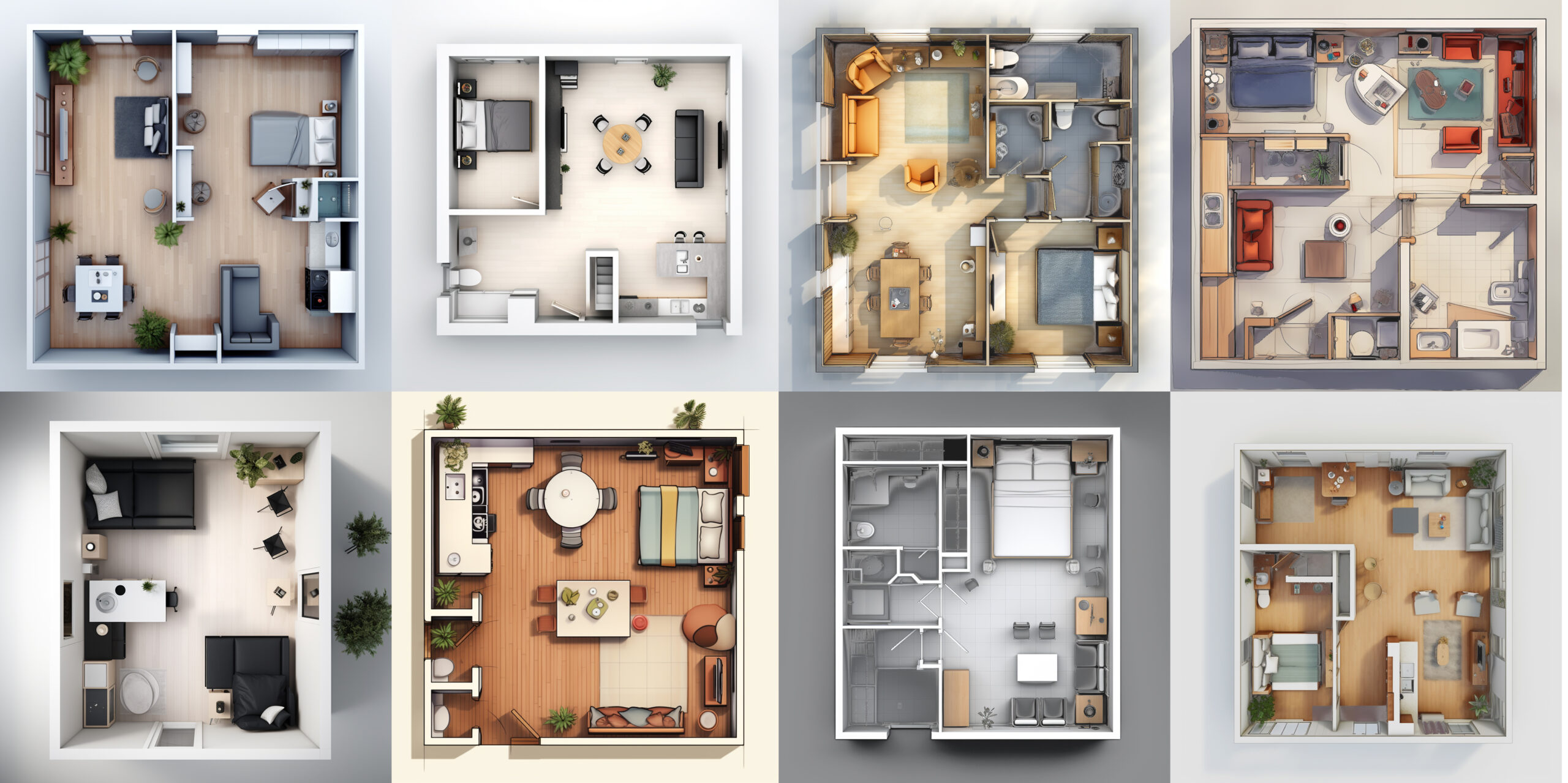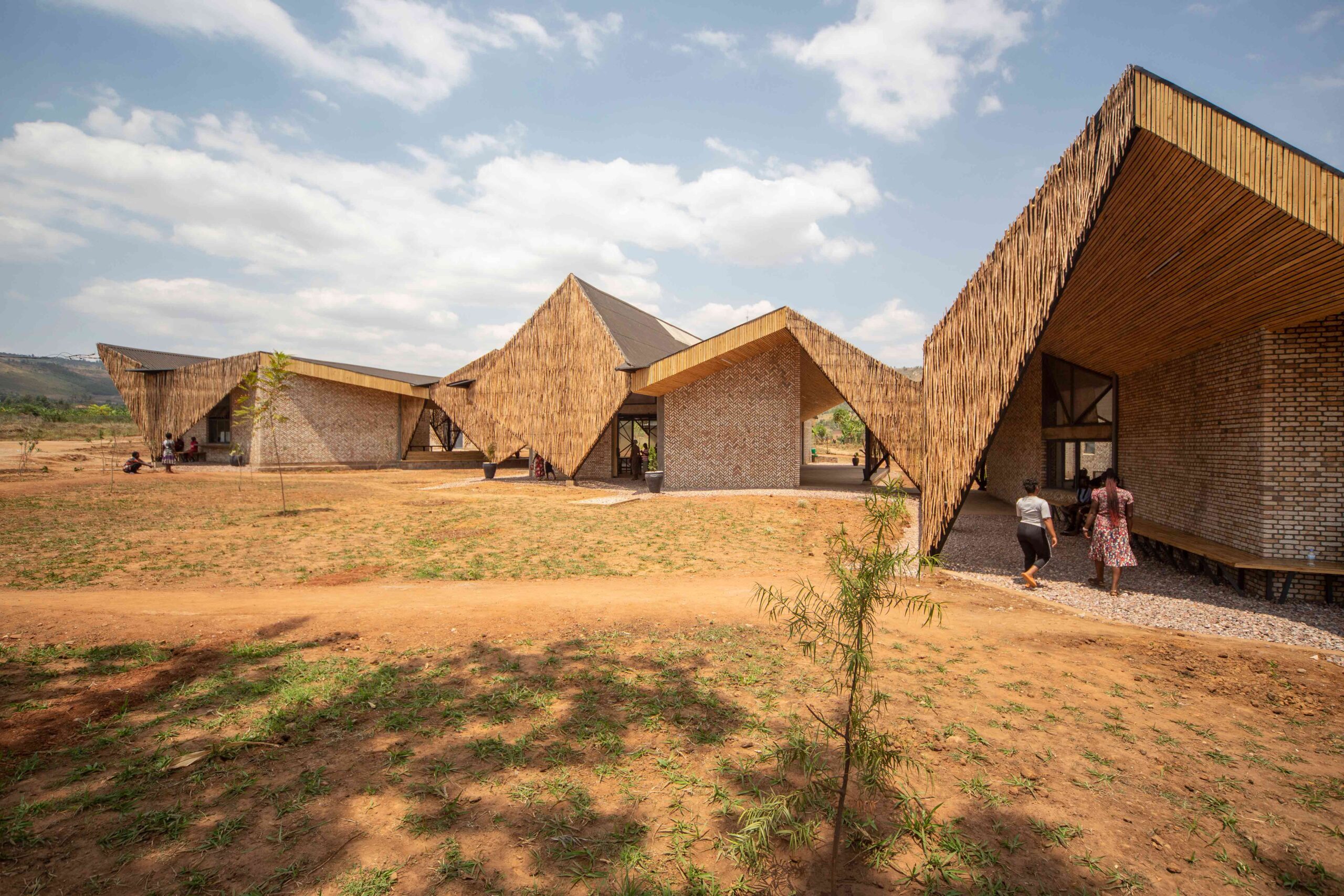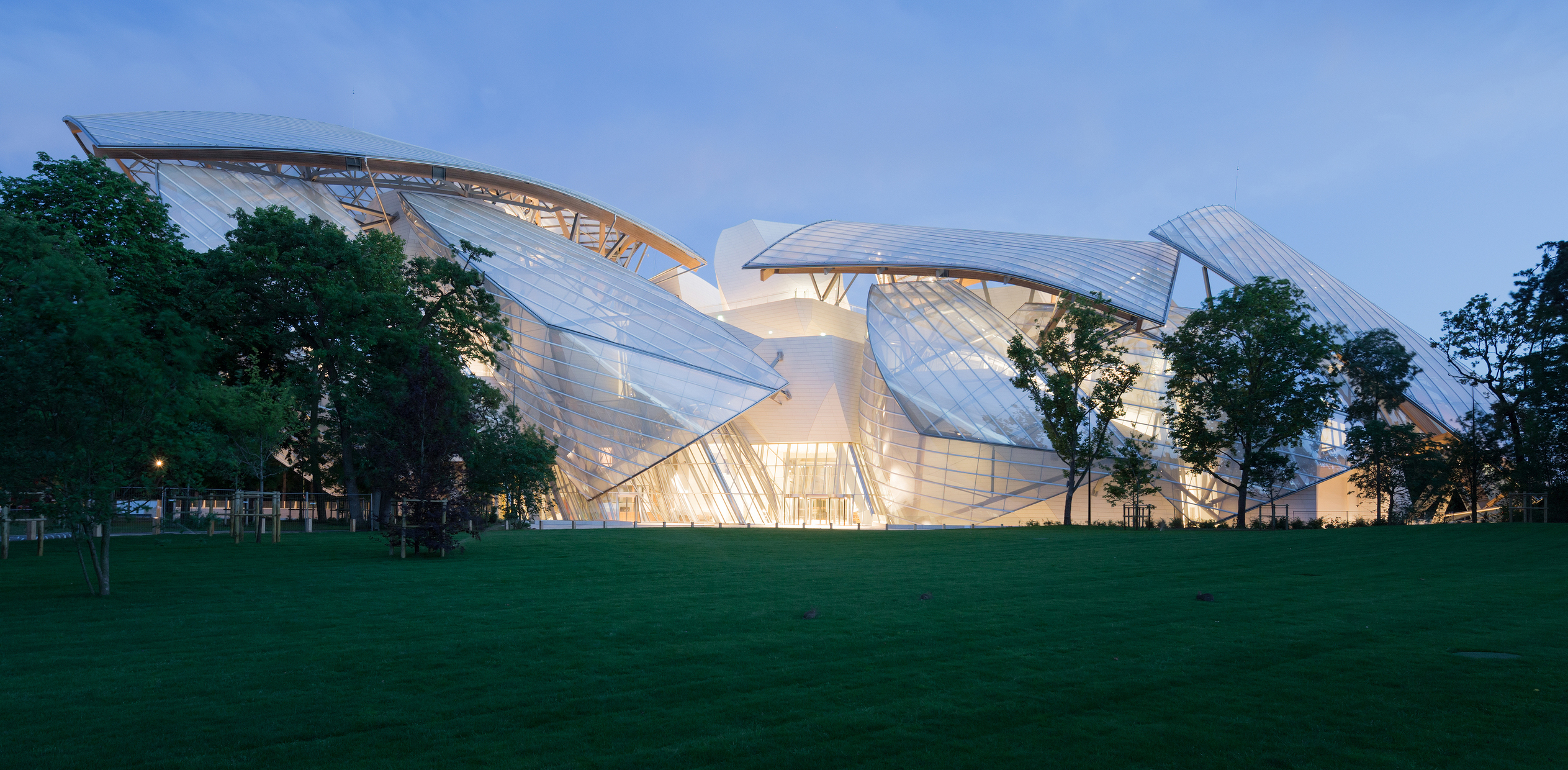This article was produced using AI tools such as Midjourney and Chat GPT, with additional edits by our editorial team. Follow Architizer's Editor in Chief Paul Keskeys on LinkedIn for more tips on harnessing AI in your architectural workflow!
While slick renderings are often key in convincing developer clients of an architectural vision, if you ask architects themselves, nothing beats a plan drawing. While hand drawing will always remain an important tool in architects’ arsenals, the following examples reveal how designers can use AI to quickly envision the orientation and flow of interior spaces, develop spatial hierarchies and consider different options pertaining to door and window positions, partition placements, furniture layouts and more.
Below, you’ll find 24 examples of AI-assisted residential floor plans, each created using generative design tool Midjourney. While not intended as fully resolved layouts, these sketch plans can form a starting point for exploring different styles of architectural representation or be added to a collection to form a mood board at the early stages of the design process.
Here are three quick tips to help you generate similar images:
- Try combining the phrases “2D architectural floor plan” and “top-down view” in your prompt to emphasize the desired format.
- Or, try including the phrase “3D architectural floor plan” to produce images that are a hybrid between a 2D plan and a 3D rendering.
- Add the instruction “–no perspective view” to explicitly exclude perspective compositions and consistently provide you with 4 plan images.
Follow Architizer’s new AI Instagram channel, @midjourneyarchitecture, where we’ll be sharing extraordinary examples of AI-assisted architecture and providing tips and tricks for mastering Midjourney. Explore the architectural images below, try the prompts out for yourself, and make sure to read all the way down for some key tips on how to perfect your Midjourney visualizations.
Open-Concept Luxury Villa
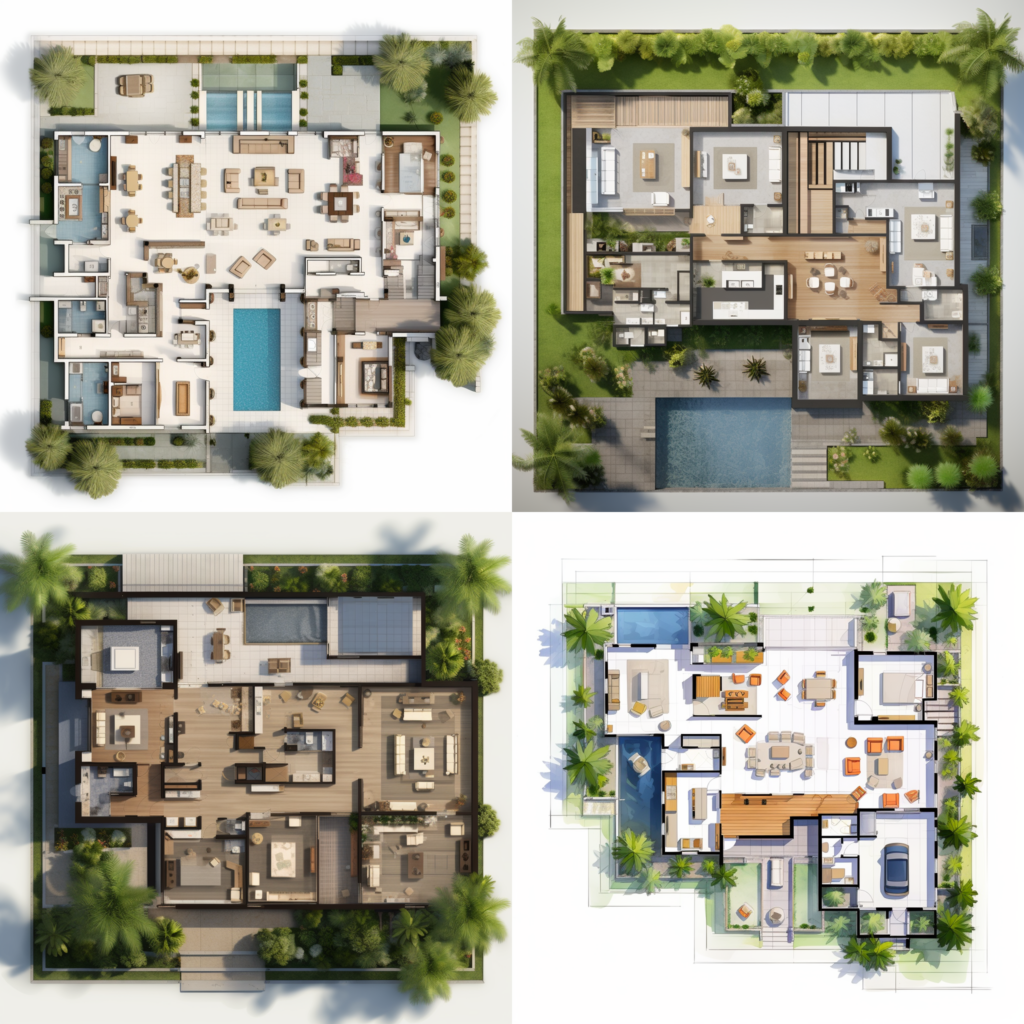 Prompt: /imagine a 2D architectural floor plan for a luxury villa with open-concept living spaces. Use varying line weights to define the relationship between public and private areas. –v 5.2
Prompt: /imagine a 2D architectural floor plan for a luxury villa with open-concept living spaces. Use varying line weights to define the relationship between public and private areas. –v 5.2
Futuristic Circular Home
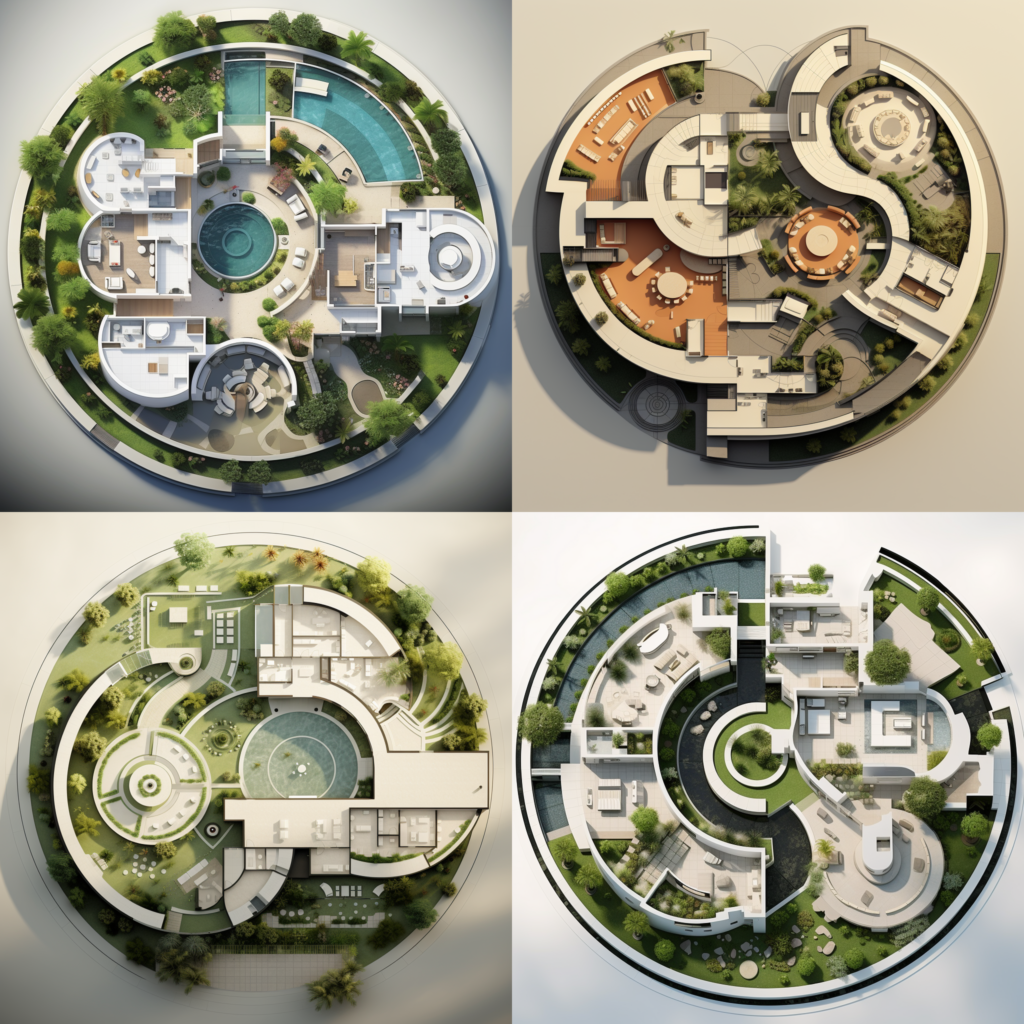 Prompt: /imagine a 2D architectural floor plan (top-down view) for a futuristic circular residence with an open central courtyard. Incorporate curved walls, a central skylight, and multiple levels connected by a spiral staircase. Include varying line weights to differentiate between key elements within the drawing –v 5.2
Prompt: /imagine a 2D architectural floor plan (top-down view) for a futuristic circular residence with an open central courtyard. Incorporate curved walls, a central skylight, and multiple levels connected by a spiral staircase. Include varying line weights to differentiate between key elements within the drawing –v 5.2
Ultra-Compact Mini Home
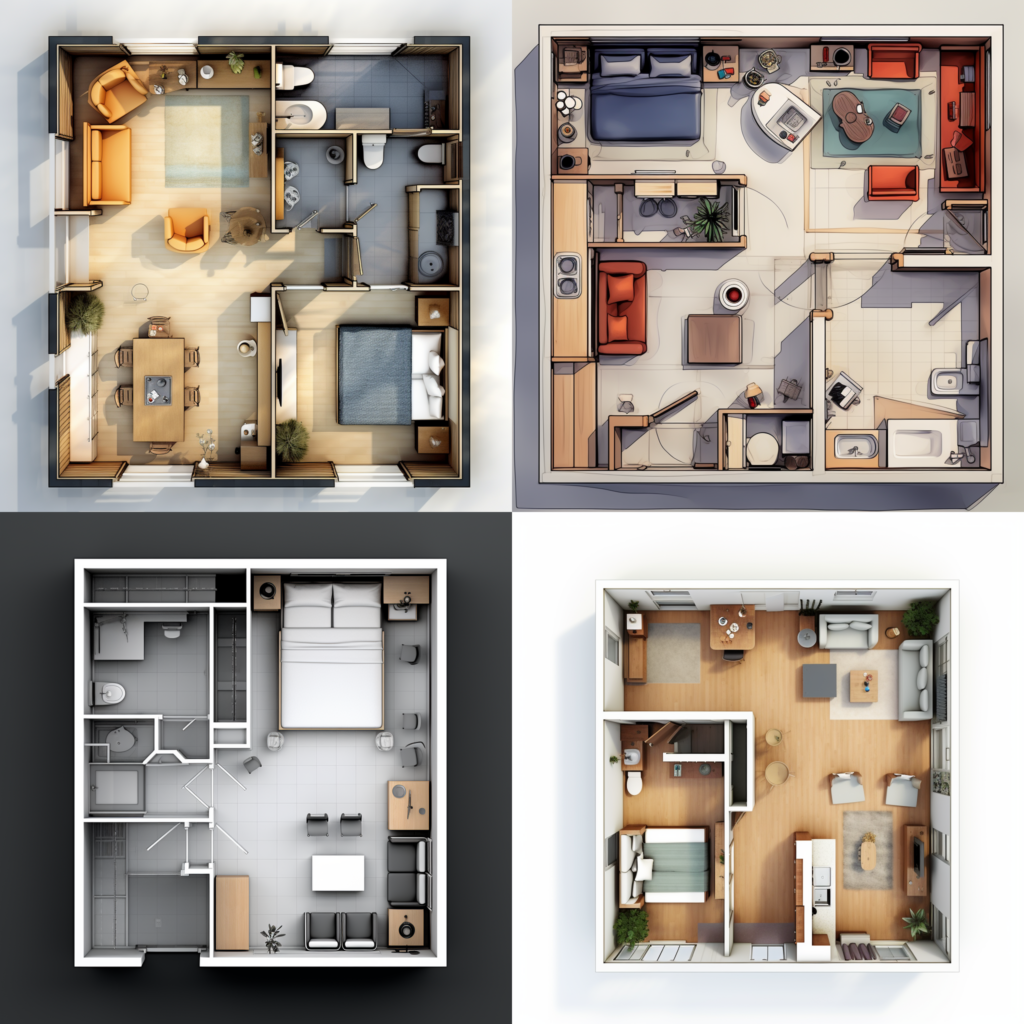 Prompt: /imagine a 2D architectural floor plan drawing for a one bedroom, ultra-compact mini home. Top-down view. Use varying line weights to distinguish walls, partitions, and functional areas. Highlight the compact layout and smart storage solutions. –v 5.2
Prompt: /imagine a 2D architectural floor plan drawing for a one bedroom, ultra-compact mini home. Top-down view. Use varying line weights to distinguish walls, partitions, and functional areas. Highlight the compact layout and smart storage solutions. –v 5.2
Flowing Coastal Retreat
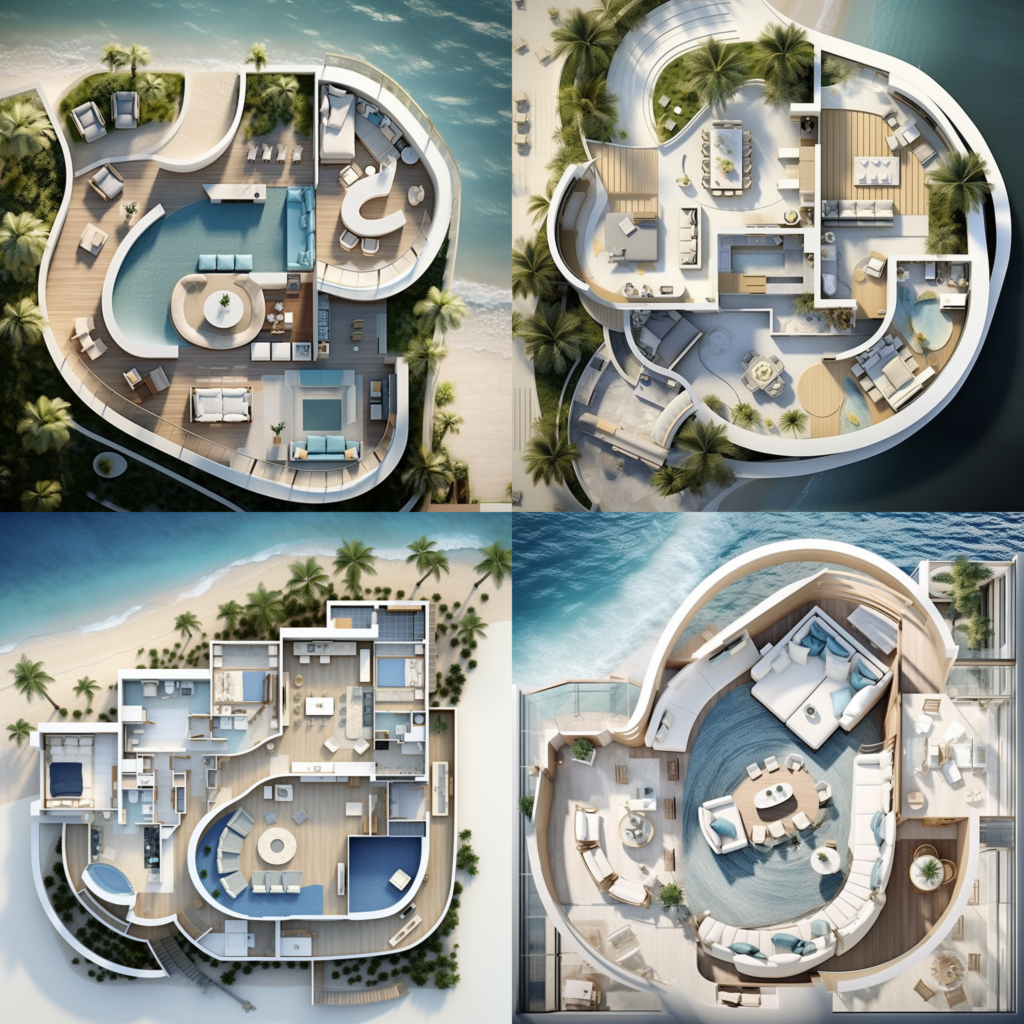 Prompt: /imagine a 3D architectural floor plan for a coastal retreat with a flowing serpentine layout. Top-down view. Utilize sweeping curves, floor-to-ceiling windows, and strategically positioned balconies to maximize ocean views. Use different line weights to create a hierarchy between elements within the drawing. –no perspective view –v 5.2
Prompt: /imagine a 3D architectural floor plan for a coastal retreat with a flowing serpentine layout. Top-down view. Utilize sweeping curves, floor-to-ceiling windows, and strategically positioned balconies to maximize ocean views. Use different line weights to create a hierarchy between elements within the drawing. –no perspective view –v 5.2
Cantilevered Modern Residence
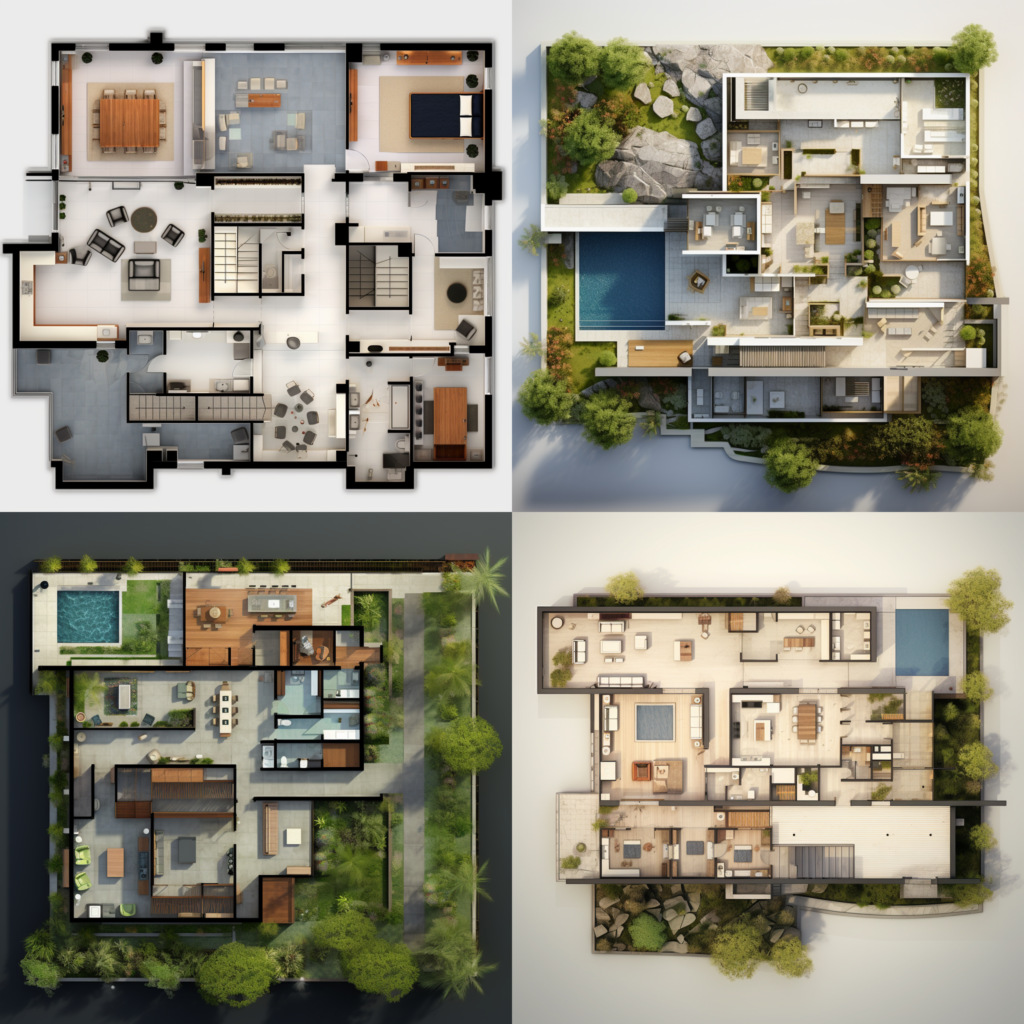 Prompt: /imagine a 2D architectural floor plan (top-down view) for a cantilevered modernist residence on a steep hillside. Apply different line weights to showcase walls, floors, and structural features. –v 5.2
Prompt: /imagine a 2D architectural floor plan (top-down view) for a cantilevered modernist residence on a steep hillside. Apply different line weights to showcase walls, floors, and structural features. –v 5.2
Treehouse-Inspired Home
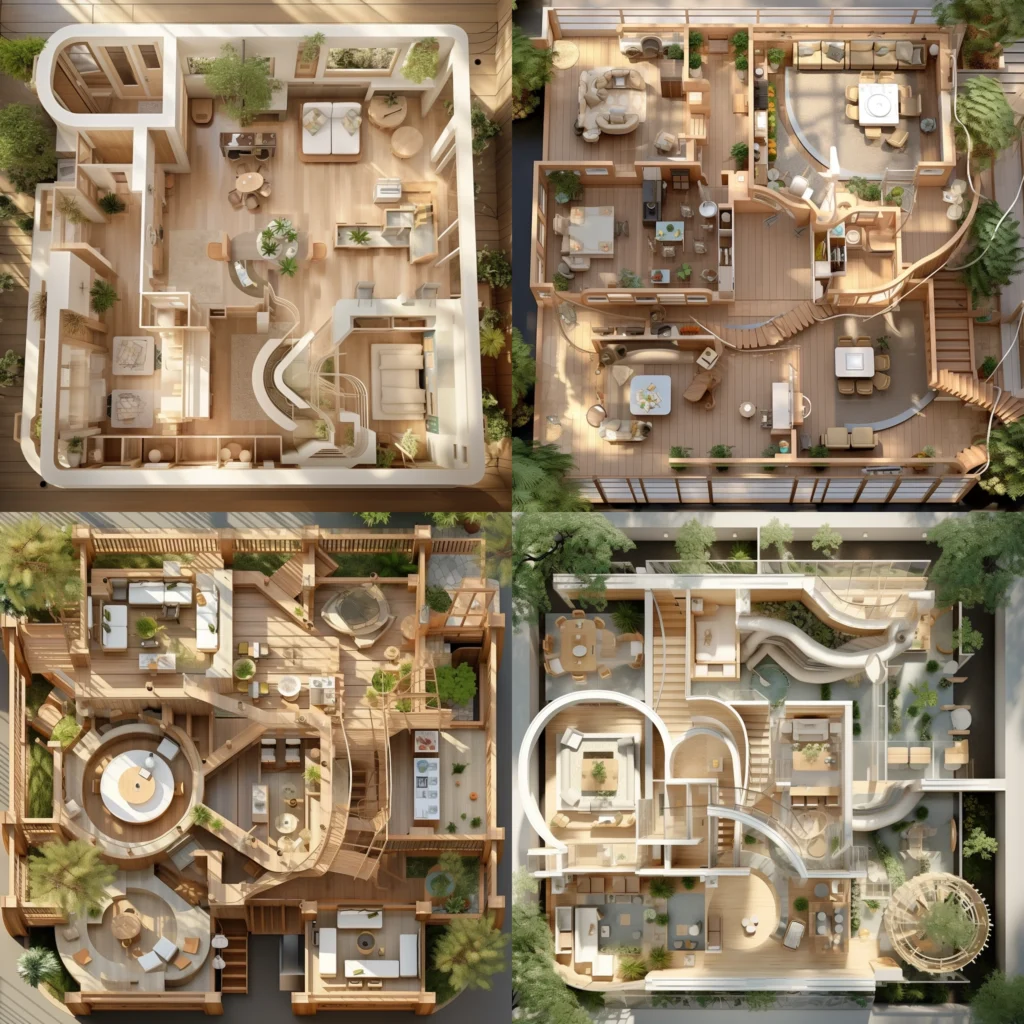
Prompt: /imagine a 3D architectural floor plan drawing (top-down view) for a contemporary treehouse-inspired residence with interconnected bridges. Create a dynamic layout with suspended walkways, large windows, and a central atrium. Light tones –no perspective view –v 5.2
3 Tips to Help You Perfect Your Midjourney Architecture Visualizations
Midjourney makes it simple to create striking imagery of any kind, but here are a few tips to take your AI-generated architectural visuals to the next level.
1. Use professional camera settings.
Unlock the full potential of your architectural visualizations with Midjourney AI by harnessing the power of professional camera settings. By specifying these settings, you can elevate your creations to a whole new level of realism and impact.
With precise control over aperture, shutter speed, ISO, and focal length, you can craft visually stunning compositions that mimic the subtleties of real-world photography. Adjusting the aperture allows you to control depth of field, lending a sense of realism and focus to your images. Fine-tune shutter speed to capture motion or create long-exposure effects. Master ISO to balance light and minimize noise, and experiment with focal length to achieve desired perspectives.
By taking command of professional camera settings, you’ll transform your architectural visualizations into captivating, lifelike experiences that leave viewers amazed. Unleash your creative potential and bring your designs to life in ways you never thought possible with Midjourney AI’s powerful capabilities.
2. Harness the power of architectural vocabulary.
Take your architectural visualizations to new heights by incorporating descriptive architectural vocabulary and keywords when generating designs with Midjourney AI. By choosing the right words to describe elements such as materials, textures, lighting, and spatial qualities, you can enhance the realism and impact of your visualizations.
Using precise terminology allows Midjourney AI to understand your design intentions more accurately, resulting in more faithful and detailed renderings. By specifying features like “glass curtain walls,” “warm wooden finishes,” or “dramatic vaulted ceilings,” you can evoke a specific atmosphere and convey your design concept with precision.
Empower your visualizations with the language of architecture, enabling Midjourney AI to create immersive, realistic representations that truly capture the essence of your vision. Let your designs speak volumes and make a lasting impression with the help of descriptive architectural vocabulary.
3. Use Midjourney acronyms.
Maximize the quality and precision of your architectural visualizations generated with Midjourney AI by leveraging specific acronyms designed to enhance your experience. By utilizing acronyms such as “–v 5.1” to specify the Midjourney version, “–ar 16:9” for a wide aspect ratio, and “–q 1” for a detailed image quality, you can achieve unparalleled control over your renderings.
By specifying the Midjourney version, you ensure compatibility with the latest features and advancements, guaranteeing optimal performance and results. The aspect ratio acronym enables you to define the proportions of your visualizations, ensuring they align seamlessly with your intended display format. Fine-tune image quality with the “q” acronym, allowing you to strike the perfect balance between file size and visual fidelity.
Embrace the power of these Midjourney acronyms to fine-tune your architectural visualizations with precision, ensuring optimal results that align precisely with your vision.
You can learn all the basics about how to use Midjourney AI in our handy guide.
Share Your AI Architecture for a Chance to Get Featured!
Calling all architectural visionaries and visual artists! Are you ready to showcase your awe-inspiring creations to a global audience? Architizer’s new Instagram channel — @midjourneyarchitecture — is the ultimate platform to elevate your AI-generated architectural imagery to new heights and inspire a fast-growing community of creators!
Here’s what you need to do:
1️⃣ Create breathtaking imagery using Midjourney AI.
2️⃣ Share your masterpiece on Instagram and tag @midjourneyarchitecture.
3️⃣ Send a DM with your image to us to catch our attention!
Our editorial team will be on the lookout for the most remarkable submissions, and select images will be featured on @midjourneyarchitecture, granting you exposure to a new audience of AI architecture aficionados, industry professionals, and design enthusiasts worldwide!
Don’t forget to follow @midjourneyarchitecture on Instagram: https://www.instagram.com/midjourneyarchitecture/
This article was produced using AI tools such as Midjourney and Chat GPT, with additional edits by our editorial team. Follow Architizer's Editor in Chief Paul Keskeys on LinkedIn for more tips on harnessing AI in your architectural workflow!
